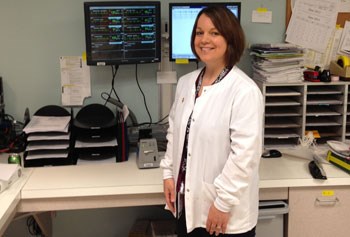Hospitals Demanding Higher Degree

06/11/2013
By Karen Angelo
Though she’s been a Registered Nurse (R.N.) for 27 years, Kim Pierce was finding it difficult to participate in her hospital improvement initiatives at the unit level. She knew she had the ability. But she also knew that she lacked some of the necessary skills.
With a strong desire to apply best patient practices in her job, she enrolled in the University’s R.N. to B.S. degree completion program 18 months ago. She graduated in May armed with the knowledge necessary to best meet the needs of her patients, organization and the future of nursing.
“The program markedly improved my writing, communication, negotiation and problem-solving skills,” says Pierce, who works per diem in the critical care unit of the cardiac rehabilitation center at Lawrence General Hospital. “I now have the ability to perform evidence-based practice critique, concept analysis and reviews of the literature to better help my patients.”
The R.N. to B.S. degree completion program is in high demand as many hospitals now require licensed R.N.s to earn bachelor degrees to solve complex problems in healthcare.
“Studies show a relationship between positive patient outcomes and nurses with higher-level degrees,” says Jennifer Wilber, faculty coordinator of the R.N. to B.S. program. “Our program helps nurses apply research to improve patient care and gain a broader understanding of issues that impact people’s lives.”
Indeed, Pierce has already applied what she’s learned directly to her patients.
“I am able to research and apply best patient practices for my post-cardiac event patients,” says Pierce. “Teaching, supporting, and guiding patients in the transition from hospital to home and cardiac rehab while helping them realize that there is life after a heart attack is very rewarding.”
Flexible Program Designed for Working Professionals
The blended program allows students to take courses online and onsite at their own pace. Then they begin the program as part of a group of students, a unified approach that helps them stay on course and graduate. The nursing courses can be completed in as little as 15 months by taking six or seven credits at a time.
“Most of the students enrolled in the program are working nursing professionals who are balancing school, family and work,” says Wilber.
Linda Consaul took just two years to complete the part-time program.
“The nursing classes taught me how to navigate the research process, interpret articles, and understand how research can be applied to the field as evidence-based practice,” says Consaul.
“A series of three classes in community health taught us the process of a community assessment and outreach intervention, which we then presented at the University’s Student Research Symposium.”
Consaul, who also graduated in May, decided to take her education even further.
“I am thrilled that I’ve been accepted into the Family Nurse Practitioner program at UMass Lowell, and will start this fall,” she says.
